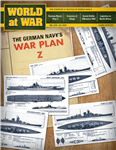
|

|

|

|
 |
|
World at War, Issue #96 - Game Edition
|
|
|


|

|
 |
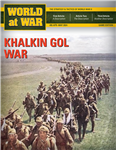
|

|

|

|
 |
|
World at War, Issue #95 - Game Edition
|
|
|

Khalkin-Gol War is an operational-level, two-player wargame covering a “what if” Japanese-Soviet war in Mongolia in 1939. The historical campaign saw a series of limited actions in the late spring and early summer of 1939 along the Khalka River (Khalkin-Gol) on the Manchukuoan-Outer Mongolian border. The campaign ended in a corps-level battle in August 1939 in which the Soviets decisively defeated the Japanese and produced a cease-fire between the two antagonists. The assumption of the game is that both Tokyo and Moscow decided instead to turn this into a full-scale war.

|

|
 |
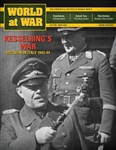
|

|

|

|
 |
|
World at War, Issue #94 - Game Edition
|
|
|

W94 Kesselring’s War: Decision in Italy 1943-44 (Joseph Miranda) is an operational level two player wargame covering the campaign in Sicily and southern Italy, July 1943 to February 1944. The game covers the months from Operation Husky through the initial landings in the southern peninsula up to the Anzio invasion and first battle of Monte Cassino. This was the time when the Allies could have gained a decisive victory but were stopped when German forces under the command of Field Marshal Albert Kesselring fought a series of delaying actions and then held a line south of Rome.

|

|
 |
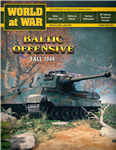
|

|

|

|
 |
|
World at War, Issue #93 - Game Edition
|
|
|

W93 Baltic Offensive, Fall 1944 (Javier Romero) Baltic Offensive: Fall 1944 is a two player simulation of the Soviet offensive in the Baltic countries in the Fall of 1944. The Soviet player must conquer as much territory as possible within a limited time frame, while the German forces must try to delay the Soviet advance as much as possible. The Soviet player has a positional advantage and numerical superiority, but it has a tight timetable to clear the Baltic countries so that the Red Army can return to the decisive direction of the war: the Vistula-Oder-Berlin axis. Each game turn represents 10 days. Each hexagon is 10 miles (15 kilometers) from side to opposite side. Units are corps, divisions, brigades or equivalents, and specialized smaller units.

|

|
 |
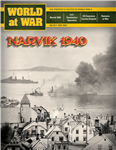
|

|

|

|
 |
|
World at War, Issue #92 - Game Edition
|
|
|

Narvik 1940 is a two-player wargame of low to intermediate complexity that simulates the battles around Narvik, Norway in 1940. To control complexity and present an overall force commander’s view of the battle, the game uses a tactically scaled map and units of maneuver coupled with an operationally scaled turn length. The Allied player is normally on the offensive, trying to clear the Germans from the Narvik area, but the German player has opportunities for counterattacks. The game starts in mid-April, after the Germans seized control of Narvik and just as the Allies have made their initial landings to begin their counteroffensive. Narvik models a battle fought in Arctic conditions with extremes of weather and long daylight hours. There was a chaotic command system on the Allied side and an overextended force on the German.

|

|
 |
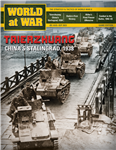
|

|

|

|
 |
|
World at War, Issue #91 - Game Edition
|
|
|

Stalin’s First Victory (1929) & The Battle of Taierzhuang (1938) This game includes two separate and distinct battles. Both battles use many of the same rules and concepts, however for ease of play, the rules are separated into two distinct rule sets. The first set of rules cover Stalin’s First Victory and the second The Battle of Taierzhuang. Both games are low complexity two-player grand tactical games.

|

|
 |
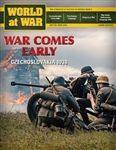
|

|

|

|
 |
|
World at War, Issue #88 - Game Edition
|
|
|

War Comes Early is a low to intermediate complexity two-player alternative history wargame. It investigates the parameters of the six weeks of the conflict that would have resulted had the Czechoslovakians refused to accept the Munich Agreement. Had they been willing to fight, the Soviets were pledged to come to their aid as fully and directly as possible. That intervention would have immediately escalated the crisis beyond a Czech-German one and into the realm of a major war.

|

|
 |
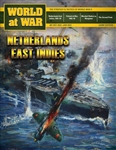
|

|

|

|
 |
|
World at War, Issue #87 - Game Edition
|
|
|

Netherlands East Indies: 1941 to 1942 is an operational wargame of the campaign in 1941-42 in which the Japanese seized control of the Dutch colonial empire in the South Pacific. NEI is a combined naval-air-land campaign, in which operational capabilities can be decisive. The game system shows the effects of various operations over the course of a scenario. Players conduct Actions which encompass discrete combat, logistical, intelligence and other operations. A player can conduct one or more Actions per turn. All units in the game use a similar combat system. The system shows the interaction of naval, air and land forces. At stake: the resources of the South Seas and the gateways to the Indian Ocean and Australia.

|

|
 |
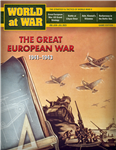
|

|

|

|
 |
|
World at War, Issue #90 - Game Edition
|
|
|

The Great European War: WWII in Europe 1941-43 is a two-player game of an alternative World War II in Europe, based on the premise that Adolf Hitler did not order the invasion of the Soviet Union in June 1941. Instead, the Axis goes over to a naval-air offensive against the British with additional operations in North Africa and the Middle East, while waiting for America to enter the war and keeping a watchful eye on Stalin who may intervene. The game assumes that the Western Allies decide on a Europe First strategy, diverting forces and logistics from the Pacific.

|

|
 |
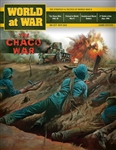
|

|

|

|
 |
|
World at War, Issue #86 - Game Edition
|
|
|

The Chaco War, 1932-1935. The Chaco War was fought out by two landlocked countries, Bolivia and Paraguay in South America. On paper, the Bolivians should win handily: they enjoyed a three to one superiority in manpower against the Paraguayans. However, to reach the front the Bolivians had to overcome long lines of communication, impossible terrain and low morale. The Paraguayans, on the other hand, saw the war as a life-or-death struggle. Thanks to their superior morale and leadership, the Paraguayans inflicted a series of defeats to the Bolivians and won most of the Chaco in the post-war peace settlement.

|

|
 |